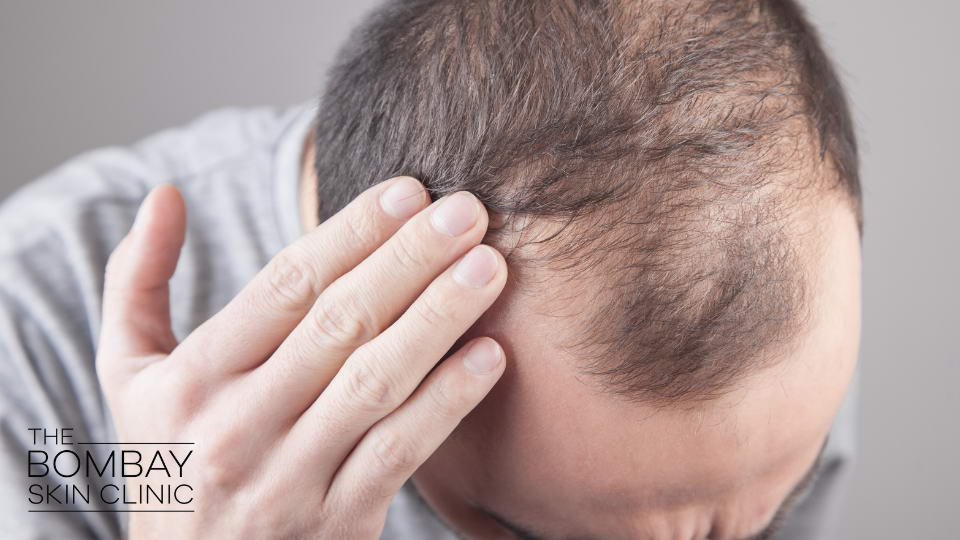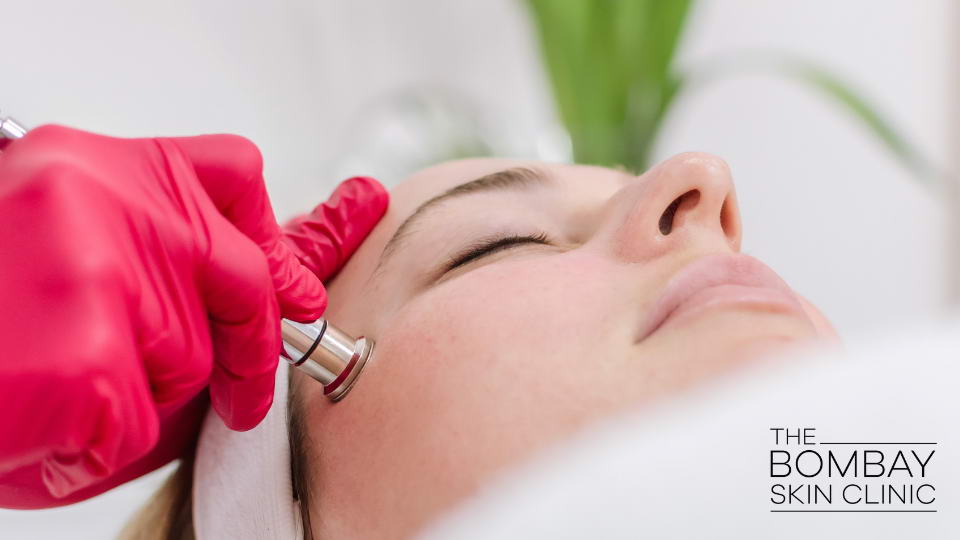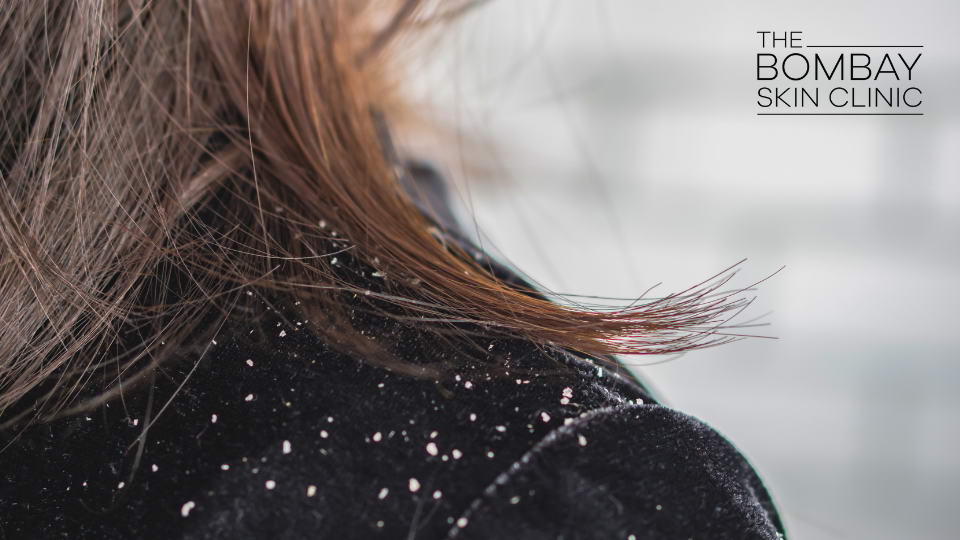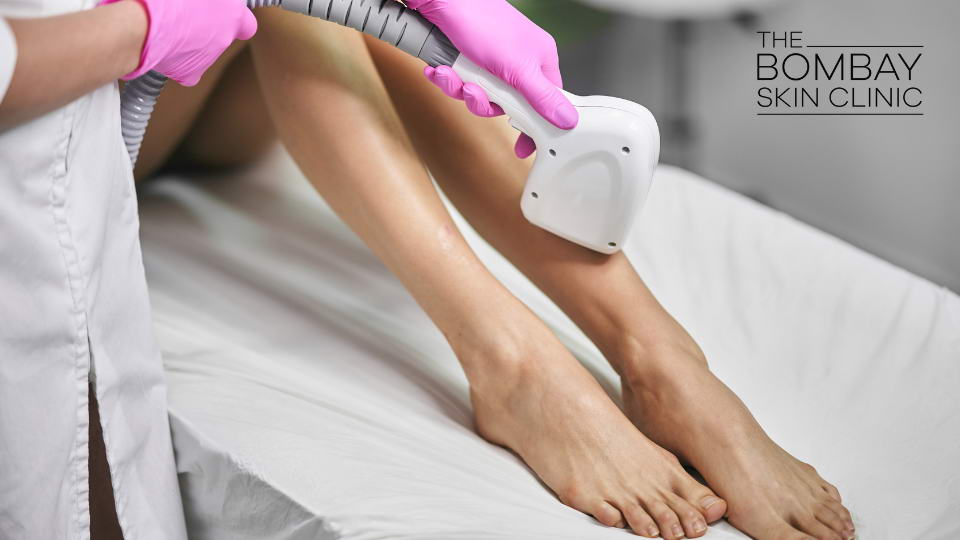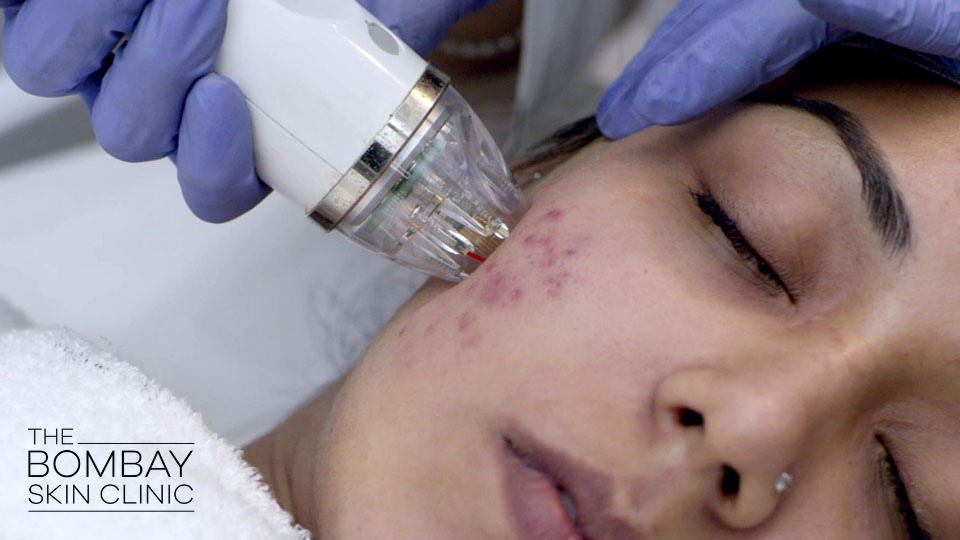Overview | Treatments at The Bombay Skin Clinic | Expected treatment outcomes | Preventing Hairloss | Symptoms and causes | Questions for your doctor
There are many scalp and hair issues that can lead to hair fall. According to Stanford Medicine, the main causes include alopecia areata, male- and female-pattern baldness, and scalp infections. Not only can hair fall alter the physical appearance but it can also really impact both men and women emotionally.
At The Bombay Skin Clinic, we understand the importance of urgent and efficient hair loss treatments. Our treatment results speak for themselves as we stand as a leading name in the fight against hair loss today.
Hair loss treatments – The Bombay Skin Clinic
Timely treatment can make a world of difference in results. At The Bombay Skin Clinic, we offer a wide range of hair loss treatments and hair growth treatments to restore your natural, lustrous locks. Moreover, throughout the treatment and healing process, we focus on your comfort and well-being as well.
Let’s take a look at how you can regain healthy hair through our care.
- Hair Growth Intravenous Nutrition Therapy – A lot of people are affected by hair fall due to incorrect eating habits and an unbalanced diet. This causes nutritional deficiency that can result in hair fall. Scientific research has discovered the role of critical and non-critical vitamins, amino acids, and minerals that can work towards fighting this form of hair loss. The Bombay Skin Clinic brings to you its very own cutting-edge Hair Growth Intravenous Nutrition Therapy. Created by Mumbai-based leading dermatologist Dr Batul Patel, this formula provides your hair with essential vitamins, trace elements, and amino acids to encourage healthy hair growth and fight hair fall.
- Prescription medicines – Medicines are prescribed to treat hair loss that occurs due to hereditary causes. The most common medicine prescribed for hair loss is Finasteride. This is given in the form of Propecia tablets. According to research from the United States Food and Drug Administration, the regular intake of this medicine shows significant results in improving hair growth with thicker hair being observed in patients impacted by male pattern baldness. However, Finasteride is never prescribed to pregnant women. In fact, women who are pregnant really need to stay away from crushed tablets where the contents are exposed as this can lead to the birth defect called hypospadias in a male fetus.
There are also cases where a patient may experience hair fall as a symptom of thyroid problems. In this case, an endocrinologist is also consulted as the symptoms of hyperthyroidism and hypothyroidism need to be diagnosed and treated to fight hair loss successfully. Women who are affected by hair fall due to an excess of male hormones may be prescribed an anti-androgen drug along with an oral contraceptive. This treatment is especially helpful for women who are affected by hair loss due to Polycystic Ovarian Syndrome (PCOS). The treatment is only given after a thorough medical checkup that will also include blood tests. Women suffering hair loss due to PCOS may be given Aldactone and Finasteride, which are male hormone blockers. For a case of high prolactin, the patient is prescribed Cabergoline to reduce prolactin production.
Oral minoxidil is also prescribed for cases of hair loss due to male-pattern baldness. This medication has very effective results with patients experiencing increased hair growth. Research has indicated that oral minoxidil can be prescribed in conditions where the patient might suffer an allergy from topical application. At The Bombay Skin Clinic, each patient’s unique medical history is carefully studied and medicines are prescribed with due consideration given to the patient’s hair fall severity, hair loss causes, and current health conditions. - Hair Fact Kits – At The Bombay Skin Clinic, we believe in holistic healing. At times, hair loss can be tackled simply by focusing on getting adequate nutrition through your diet. Just like any other part of the human body, the hair, too, requires good nutrition. Hair Fact Kits are ideal for boosting your nutrition. Some of the most important nutrients for hair health are vitamins A, C, and D. A certain vitamin B known as biotin is also crucial. Iron deficiency is also known to cause hair loss. If you have hair loss due to any of these nutritional deficiencies, it can be easily rectified by changing your diet habits or simply adding supplements prescribed by your doctor.
- Scalp micropigmentation – Akin to getting a tattoo, scalp micropigmentation deposits thousands of tiny pigments into the scalp epidermis. The result is a scalp surface that truly resembles a natural shaved head. This treatment is suitable for both men and women. At The Bombay Skin Clinic, our patients are delighted with the results from scalp micropigmentation. There is no downtime, no side-effects, and virtually no pain. Most of all, the pigment used in the procedure is FDA-approved. You can even choose the kind of hairline you want to create for your new look.
- Dermapen – One of the most effective hair loss treatments available, microneedling works by creating minute pricks on the epidermis of the scalp. These pricks encourage the body’s natural response of healing itself. And, while the pricks heal, collagen is produced, which can reverse hair growth. The Bombay Skin Clinic uses the Dermapen 4, which is the latest technology in microneedling. Our patients are thrilled with the results and especially praise the fact that there are no side-effects and no downtime with this modern marvel in hair growth treatments.
- Regenera Activa – This advanced treatment regenerates capillary vessels to stimulate hair growth. Regenera Activa is based on the principles of regenerative medicine that focus on regenerating human tissues or cells to re-establish normal functioning. Regenera Activa helps prevent miniaturization of hair follicles. It is natural, safe, and has no side-effects. Patients usually see results within three or four months. Apart from stimulating new hair growth, this treatment is also known to improve the volume of existing hair. The treatment process is also approved by the FDA.
- Platelet-rich plasma treatment – This treatment makes use of the patient’s own platelets in order to increase hair growth while minimizing hair loss. PRP also focuses on preventing the miniaturization of hair follicles. PRP has many advantages. It helps reduce scar visibility, speeds up the healing of wounds, leads to the growth of thicker hair, and reduces hair loss. The Bombay Skin Clinic utilizes the latest in hair growth treatments in its effective PRP treatments that have seen fabulous results in patients impacted by severe hair loss.
- LLLT – Laser treatments for hair loss are done mainly through a method known as low-level laser therapy. Also known as red light therapy, this treatment exposes photons to the tissues of the scalp. These photons are absorbed and encourage hair growth. Studies have shown that laser treatments in low doses can stimulate circulation in hair follicles, which leads to hair growth. The biggest advantages of LLLT are that this treatment is painless and non-invasive. It also strengthens hair and is highly recommended by leading dermatologists worldwide.
- FUE Hair transplant – Commonly known as hair transplant, this treatment method works by extracting follicular units from areas where there is abundance of hair and then transplanting the grafts into areas that are affected by hair loss or baldness. The procedure is also known as Follicular Unit Extraction (FUE). Hair transplant is a procedure that takes several hours to perform. It does offer superior results. Post the treatment, there is very little swelling. The hair specialist will prescribe antibiotics and anti-inflammatory medicines as required. Most patients see results within six to nine months. Some patients are also prescribed the drug minoxidil to supplement hair growth after the transplant procedure.
- Scalp injections (steroids) – Steroid injections are also used to treat hair fall in patients who have been diagnosed with alopecia. These injections are directed at the bald patches of the scalp and work towards stimulating hair follicles for renewed hair growth. It is important to note that these corticosteroid injections do not work on patients who have been diagnosed with age-related baldness. There may be certain side effects such as the thinning of the scalp skin. Your hair specialist will advise you on these before going ahead with the treatment.
- Surgery (scalp reduction) – Also known as scalp lifting, scalp reduction is known to be one of the best treatments for patients impacted by male-pattern alopecia. This procedure involves a stretching of the part of the scalp that has dense hair growth to cover areas that are affected by baldness. The entire procedure can last anywhere between one to two hours while the patient is administered local anesthesia. Scalp reduction is usually not the first line of treatment for excessive hair fall. There are many factors that your hair specialist will consider before recommending scalp reduction. These include the presence of sufficient donor hair as well as good elasticity of the scalp.
- Mesotherapy for alopecia – This non-surgical hair loss treatment method works through microinjections that are placed at the scalp’s epidermis in order to stimulate the hair and help it regenerate naturally. The main thought at the center of this treatment is the knowledge that most cases of hair problems arise from improper circulation and the lack of adequate nutrition to the scalp. The injections given aim to overcome these issues and imbalances to restore minerals, vitamins, and other essential nutrients to encourage hair growth. The mesotherapy injections are customized for each patient for optimal results.
Expected outcome and prognosis
The results of hair loss treatments vary between patients. When looking at hair transplants, patients may have to wait around six to nine months before they see results. On the other hand, Regenera Activa shows results within three or four months. Then again this can vary.
At The Bombay Skin Clinic, we advise each patient on the term of their treatment depending on their type and severity of hair loss.
Preventing hair loss in the future
In most cases, hair fall can actually be lessened before it leads to baldness. Here are some quick tips that will actually help you minimize and/or prevent hair loss.
- Eat healthy and include plenty of vitamin A and biotin in your diet
- Massage your hair with castor oil, which is known for its hair-growth properties
- Drink at least eight glasses of water a day to keep your hair hydrated
- Use a hair mask once a week to keep your locks nourished
- Avoid washing your hair with hot water
Now that we have explored the various hair loss treatment options available, let’s delve deeper into what exactly constitutes and causes hair loss.
Symptoms of hair loss
Hair loss starts off as a gradual loss of hair on the scalp. Men often experience a receding hairline that tends to develop a shape like the letter ‘M’. Women tend to experience a parting at the center of their head. Some patients experience hair fall all over their body.
Hair loss differences in men and women
Men and women lose hair quite differently. While men tend to experience a receding hair line and a bald patch at the crown, women tend to notice a widening center parting on their head.
Men go through seven stages of hair loss according to the Norwood Scale. Each stage worsens in severity. At stage one, there is barely any physical indication of hair loss; however, as the stage progress, hair begins to recede from the hairline and the vertex. This continues until the final stage where there is next to complete baldness with a single band of hair that remains at the sides of the scalp.
The Harvard Medical School uses the Ludwig Classification to show how women lose hair in three phases. In the first phase, hair loss is noticed only through the strands that fall off, though the scalp exhibits no physical signs. Phases two and three show visible signs of baldness as the center parting widens until a large portion of the scalp can be seen.
Causes of hair loss
The medical causes for hair loss can include a family history of the condition, hormonal health issues, autoimmune disease alopecia areata, menopause, and radiation therapy. Some patients experience hair fall due to lifestyle factors such as excessive stress or tight hairstyles that can damage the hair root.
Hair loss diagnosis
Hair loss is diagnosed through a series of tests that include a physical pull test, blood tests, and light microscopy. In some cases, the hair specialist may perform a scalp biopsy. At The Bombay Skin Clinic, we ensure to customize each patient’s treatment for the most comfortable and effective experience.
Questions to ask your hair specialist
To get the most out of your treatment, here are some questions to get answered when you meet your hair specialist:
- What is causing my hair loss?
- How long before I see results after my treatment?
- Are there any dietary or lifestyle restrictions that I need to follow while on treatment?
- Does my insurance cover this treatment?
- Is there any written material or website I can refer to for learning more about my hair loss / hair growth treatments?
At The Bombay Skin Clinic, we truly believe in educating our patients as much as possible on each detail of their hair treatment procedure. More knowledge automatically leads to better results.
Closing paragraph
Hair loss can truly dampen your day. The good news is that the many advancements in modern medicine allow us to push the permanency of hair loss to the distant past. At The Bombay Skin Clinic, we offer the highest quality of hair loss treatments for our patients. With a record of fantastic results that stretches across thousands of successfully treated patients, we look forward to helping you solve all your hair care concerns. Walk in to The Bombay Skin Clinic today and walk out with the best version of you.
References
- Stanford Medicine (Stanford Health Care): https://stanfordhealthcare.org/medical-clinics/hair-loss-clinic.html
- U.S. Food & Drug Administration: https://www.accessdata.fda.gov/drugsatfda_docs/label/2011/020788s018lbl.pdf
- Harvard Health Publishing: https://www.health.harvard.edu/staying-healthy/treating-female-pattern-hair-loss

